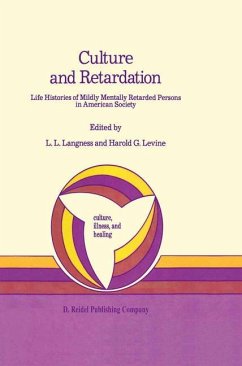
Culture and Retardation
Life Histories of Mildly Mentally Retarded Persons in American Society
Herausgeber: Levine, H.G., Langness, L.L.
Versandkostenfrei!
Versandfertig in 1-2 Wochen
39,99 €
inkl. MwSt.
Weitere Ausgaben:

PAYBACK Punkte
20 °P sammeln!
Mental retardation in the United States is currently defined as " ... signif icantly subaverage general intellectual functioning existing concurrently with deficits in adaptive behavior, and manifested during the development period" (Grossman, 1977). Of the estimated six million plus mentally retarded individuals in this country fully 75 to 85% are considered to be "func tionally" retarded (Edgerton, 1984). That is, they are mildly retarded persons with no evident organic etiology or demonstrable brain pathology. Despite the relatively recent addition of adaptive behavior as a factor in the de...
Mental retardation in the United States is currently defined as " ... signif icantly subaverage general intellectual functioning existing concurrently with deficits in adaptive behavior, and manifested during the development period" (Grossman, 1977). Of the estimated six million plus mentally retarded individuals in this country fully 75 to 85% are considered to be "func tionally" retarded (Edgerton, 1984). That is, they are mildly retarded persons with no evident organic etiology or demonstrable brain pathology. Despite the relatively recent addition of adaptive behavior as a factor in the definition of retardation, 1.0. still remains as the essential diagnostic criterion (Edgerton, 1984: 26). An 1.0. below 70 indicates subaverage functioning. However, even such an "objective" measure as 1.0. is prob lematic since a variety of data indicate quite clearly that cultural and social factors are at play in decisions about who is to be considered "retarded" (Edgerton, 1968; Kamin, 1974; Langness, 1982). Thus, it has been known for quite some time that there is a close relationship between socio-economic status and the prevalence of mild mental retardation: higher socio-economic groups have fewer mildly retarded persons than lower groups (Hurley, 1969). Similarly, it is clear that ethnic minorities in the United States - Blacks, Mexican-Americans, American Indians, Puerto Ricans, Hawaiians, and others - are disproportionately represented in the retarded population (Mercer, 1968; Ramey et ai., 1978).














